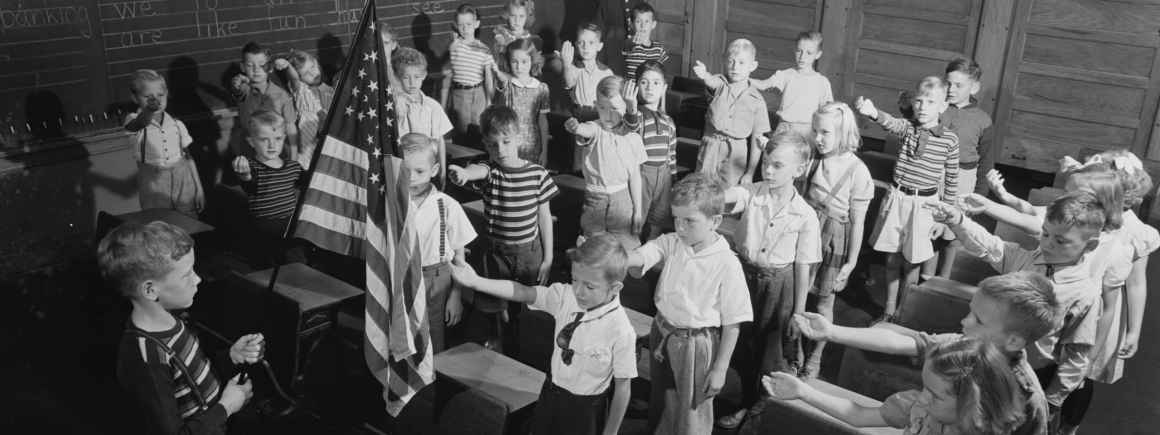LEGAL BRIEFS: Learn more about ACLU-WV's recent legal work
Sometimes the threat of a lawsuit is enough. Discover how our legal team has stoof up for students' constitutional rights, protected free speech at city council meetings, and ensured transgender students aren't humiliated at graduation by letting public official know we'll see them in court.

Not every legal issue gets resolved in a courtroom. Sometimes, simply knowing that ACLU-WV is watching is enough for officials to change course.
Over the past year, our legal team has reached out to school officials, city governments and others to explain potential civil liberties concerns.
Barnette v. Board of Education Revisited
On the anniversary of our landmark case Barnette v. Board of Education, a 1943 ruling finding that public schools cannot compel students to salute the flag or recite the Pledge of Allegiance, ACLU-WV discovered several K-12 schools still had policies requiring students to do just that.
A review of every high school and several middle schools in West Virginia found at least six that unconstitutionally required students to remove hats, stand for flag-raising ceremonies, and other forms of compelled expressive speech.
Educational letters were sent to officials at Calhoun Middle/High School, Summers County Comprehensive High School, Richwood High School in Nicholas County, and Sissonville Middle, John Adams Middle and Riverside High schools in Kanawha County.
"Not only has this question been settled, it was settled right here in Kanawha County eight decades ago," ACLU-WV Legal Director Aubrey Sparks said. "Any school that is requiring students to salute or pledge allegiance to the flag is doing so in violation of 81 years of legal precedent."
The letters were prepared by the ACLU-WV legal department with assistance from legal fellows Patrick Hassen (West Virginia University College of Law) and London Henderson (American University Washington College of Law).
"The Constitution affords protection for Americans to freely express our beliefs and ideas. That protection expands beyond written and spoken word; it extends to symbolic speech as well. People can express themselves through drawing, music, dance, or hairstyles among many others. One powerful way that people can express themselves is by choosing to remain silent when everyone else is agreeing, or remaining sitting when everyone else stands. Barnette codified that right. Students still have that right in schools today. Students cannot be compelled to recite, stand, or salute for the flag or the Pledge of Allegiance," the letter stated.
If your public school is forcing you to salute the flag or recite the Pledge of Allegiance, contact the ACLU-WV legal team at or call 304-345-9246.
Parkersburg City Council tries to limit free speech
ACLU-WV also sent a letter telling Parkersburg City Council members that they may be violating people's free speech rights by barring them from so much as mentioning council members during public meetings. Several community members have contacted ACLU-WV with concerns about the policy.
In the April 3 letter, ACLU-WV Legal Director Aubrey Sparks told council members that such a policy is "blatantly and unquestionably impermissible."
Council members have been enforcing a policy that prohibits members of the public from criticizing council members or even mentioning them during public comments at council meetings, according to community members. The policy is a form of content-based restriction of free speech in a public forum, Sparks said.
"The ability to criticize government officials is part of the foundation of our democracy," Sparks said. "Free speech by nature includes criticism of government officials. Parkersburg City Council has a choice: They can grow thicker skin or we'll see them in court."
Sparks said the matter is not yet resolved and that ACLU-WV is watching the actions of the council closely going forward.
Protecting trans kids at graduation
In April, ACLU-WV was contacted by a Raleigh County parent who said school officials were planning to deadname her child at his graduation ceremony, despite having used his chosen name for years.
Deadnaming is the act of referring to a transgender or non-binary person by the name they were given at birth after they have chosen a new name. It is considered disrespectful and can be hurtful because it invalidates their gender identity and chosen name. Studies have shown that deadnaming can increase depression, self-harm and even suicidal ideation among young trans people.
Executive Director Eli Baumwell wrote to school officials to explain the student's rights. In addition to explaining the harm caused by deadnaming, the letter cited Grimm v. Gloucester County School Board, which held in part that failure to update a trans student's records is a violation of their rights to equal protection, and Bostock v. Clayton County, which held that that discrimination based on gender identity is, by definition, sex discrimination under Title VII. Although Bostock concerned employment discrimination, it has been widely interpreted to also apply to educational and other settings.
Shortly after the letter was sent, the parent contacted ACLU-WV to say the school had reversed course and would use the student's correct name.